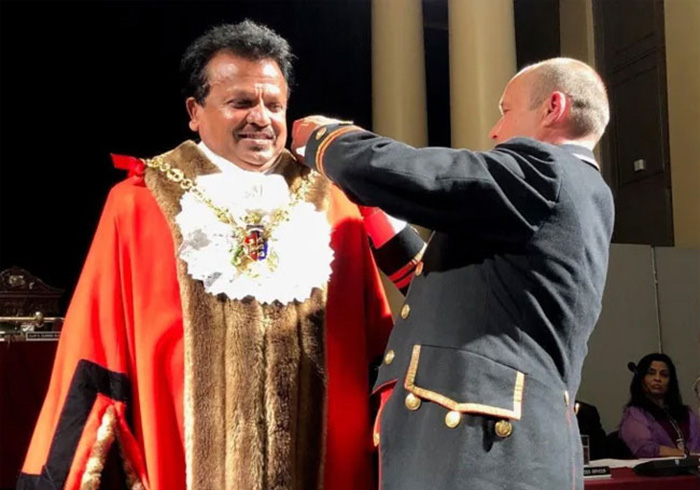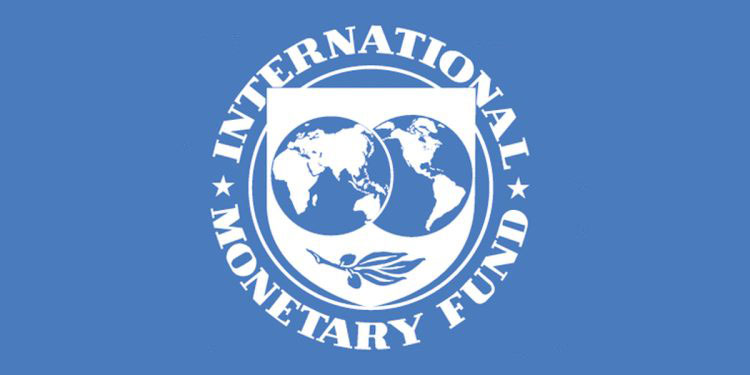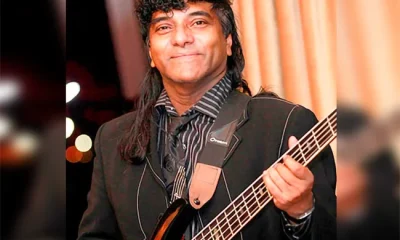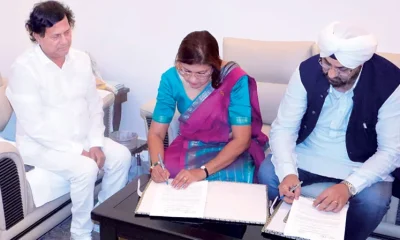News
Refugee from Sri Lankan now Labour Party Mayor of UK town

…worked in India, Uganda and Ruwanda before arriving in the UK
A Sri Lankan Tamil, who fled the country during the conflict, has been appointed the Mayor of Ipswich Borough Council.
According to the British media, Labour Councillor Elango Elavalakan is the first Hindu to hold that position. Members of Ipswich’s Hindu community attended Wednesday (15) evening’s ceremony, with celebrations at the nearby temple planned for later in the week.
Having fled Sri Lanka, Elavalakan lived and worked in India, Uganda and Rwanda before moving to the UK, the media reported. He initially moved to Ilford, in east London, before moving to Ipswich in 2006.
Labour Councillor Elango Elavalakan has taken over the ceremonial role after a unanimous vote at Ipswich Borough Council’s annual meeting.
“I’m so happy today, and very proud to be Mayor of this great town,” the media quoted Elavalakan as having said.
Council leader Neil MacDonald, who proposed the nomination, said Elavalakan would get to read out a general election result during his year in office.
“The announcement by a refugee who fled war and persecution, and who has made a new life and contributed to society here, will send a message,” MacDonald said.
Dr. Sachin Karale, Chair of Ipswich Hindu Samaj, said: “It shows the great diversity and multiculturalism of Ipswich town that a Hindu man is becoming Mayor. I’m really proud.”Elavalakan’s wife, Manchula Elavalakan, will be his consort.
The Mayor’s theme for the year will be “support and wellbeing” with his two chosen charities Genesis Orwell Mencap and Cancer Support Suffolk. ‘Ipswich is my home town’
“When I came for one project here, in Ipswich, I felt the people were very friendly,” he said. “So I decided, Ipswich is my home town.” He became a Labour councillor for St John’s ward in 2014.
“Having lived in many different countries and experienced many different lifestyles, I have always been interested in helping those that need it,” he said. “I am passionate about empowering communities and representing those in need.” Elavalakan is not the first Ipswich Mayor from the Indian sub-continent, however.
Kavas Jamas Bashah was born in Mumbai and was a senior officer of the Indian Civil Service.
He retired to Ipswich and became Mayor in 1925.
The town elected its first Mayor, Benjamin Brame, in 1836, following the Municipal Corporations Act the previous year which reformed local government and made Ipswich a municipal borough. Its first female mayor was Mary Whitmore, in 1946.
She was a suffragette and member of Women’s Social and Political Union (WSPU), and was made MBE in 1951 for her contribution to public services.
Albert Grant became Ipswich’s first black councillor and mayor of Ipswich in 1995.
He moved to the UK in 1955 at the age of 21 and has dedicated his life to tackling racism and fighting to secure equality and justice.
Latest News
Sun directly overhead Delft, Pooneryn, Elephant pass and Chundikulam at about 12:10 noon today (14th)

On the apparent northward relative motion of the sun, it is going to be directly over the latitudes of Sri Lanka during 05th to 14th of April in this year.
The nearest areas of Sri Lanka over which the sun is overhead today (14th) are Delft, Pooneryn, Elephant pass and Chundikulam at about 12:10 noon.
Business
IMF staff team concludes visit to Sri Lanka

An International Monetary Fund (IMF) team led by Evan Papageorgiou visited Colombo from April 3 to 11, 2025. After constructive discussions in Colombo, Mr. Papageorgiou issued the following statement:
“Sri Lanka’s ambitious reform agenda supported by the IMF Extended Fund Facility (EFF) continues to deliver commendable outcomes. The post-crisis growth rebound of 5 percent in 2024 is impressive. Inflation declined considerably in recent quarters and has fallen to ‑2.6 percent at end-March 2025. Gross official reserves increased to US$6.5 billion at end-March 2025 with sizeable foreign exchange purchases by the central bank. Substantial fiscal reforms have strengthened public finances.
“The recent external shock and evolving developments are creating uncertainty for the Sri Lankan economy, which is still recovering from its own economic crisis. More time is needed to assess the impact of the global shock and how its implications for Sri Lanka can be addressed within the contours of its IMF-supported program.
“The government’s sustained commitment to program objectives is ensuring policy continuity and program implementation remains strong. Going forward, sustaining the reform momentum is critical to safeguard the hard-won gains of the program and put the economy on a path toward lasting macroeconomic stability and higher inclusive growth.
“Against increased global uncertainty, sustained revenue mobilization efforts and prudent budget execution in line with Budget 2025 are critical to preserve the limited fiscal space. Boosting tax compliance, including by reinstating an efficient and timely VAT refund mechanism, will help contribute to revenue gains without resorting to additional tax policy measures. Avoiding new tax exemptions will help reduce fiscal revenue leakages, corruption risks and build much needed fiscal buffers, including for social spending to support Sri Lanka’s most vulnerable. Restoring cost recovery in electricity pricing will help minimize fiscal risks arising from the electricity state-owned enterprise.
“The government has an important responsibility to protect the poor and vulnerable at this uncertain time. It is important to redouble efforts to improve targeting, adequacy, and coverage of social safety nets. Fiscal support needs to be well-targeted, time-bound, and within the existing budget envelope.
“While inflation remains low, continued monitoring is warranted to ensure sustained price stability and support macroeconomic stability. Against ongoing global uncertainty, it remains important to continue rebuilding external buffers through reserves accumulation.
“Discussions are ongoing, and the authorities are encouraged to continue to make progress on restoring cost-recovery electricity pricing, strengthening the tax exemptions framework, and other important structural reforms.
“The IMF team held meetings with His Excellency President and Finance Minister Anura Kumara Dissanayake, Honorable Prime Minister Dr. Harini Amarasuriya ; Honorable Labor Minister and Deputy Minister of Economic Development Prof. Anil Jayantha Fernando, Honorable Deputy Minister of Finance and Planning Dr. Harshana Suriyapperuma, Central Bank of Sri Lanka Governor Dr. P. Nandalal Weerasinghe, Secretary to the Treasury Mr. K M Mahinda Siriwardana, Senior Economic Advisor to the President Duminda Hulangamuwa, and other senior government and CBSL officials. The team also met with parliamentarians, representatives from the private sector, civil society organizations, and development partners.
“We would like to thank the authorities for the excellent collaboration during the mission. Discussions are continuing with the goal of reaching staff-level agreement in the near term to pave the way for the timely completion of the fourth review. We reaffirm our commitment to support Sri Lanka at this uncertain time.”
News
New Year dawns at the auspicious time of 03.21 a.m. tomorrow (14).

The Sinhala and Tamil New Year will dawn at the auspicious time of 03.21 a.m. tomorrow (14th Monday).
The auspicious time to light the hearth and prepare the first meal is at 0404 am on Monday (14) facing South.
The auspicious hour to commence work, perform the first transactions and partaking of the first meal is at 0644 am facing South dressed in white coloured clothes.
-

 News2 days ago
News2 days agoSuspect injured in police shooting hospitalised
-

 Features3 days ago
Features3 days agoRobbers and Wreckers
-

 Features5 days ago
Features5 days agoSri Lanka’s Foreign Policy amid Geopolitical Transformations: 1990-2024 – Part III
-

 Midweek Review5 days ago
Midweek Review5 days agoInequality is killing the Middle Class
-

 Business2 days ago
Business2 days agoSanjiv Hulugalle appointed CEO and General Manager of Cinnamon Life at City of Dreams Sri Lanka
-

 Features6 days ago
Features6 days agoA brighter future …
-

 Business4 days ago
Business4 days agoNational Anti-Corruption Action Plan launched with focus on economic recovery
-

 News5 days ago
News5 days agoIChemC signs MoU with KIIT, India











